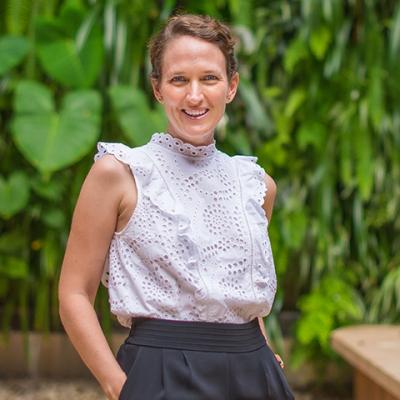Studying a higher degree by research isn’t something you choose to do overnight – well, not for most people. So, to help you make this decision, we’ve reached out to some alumni and compiled some data to help you work out if a Doctor of Philosophy would be worthwhile for you.
When you’re considering such a big academic step, it’s normal to wonder: is a PhD worth it?
Anecdotal evidence and statistics both tell us the benefits of PhD study do indeed outweigh the time and effort required. Let’s explore:
- why a PhD is worth it (personal and professional benefits)
- worthwhile reasons to pursue a PhD
- the average salary of a PhD graduate (financial value of a PhD).
Is it worth doing a PhD? (Personal and professional benefits)
For UQ PhD alumni Angie Knaggs, Benjamin Jones and Brigid Lynch, answering this question in hindsight is easy – and the answer is a resounding yes. Their stories may help you make this choice without that advantage of hindsight.
Why a PhD was worth it for Angie
Angie’s PhD was a natural continuation of the theses she wrote during her honours and master’s programs, focusing on popular culture representations of masculinity in crisis. In short, she studied the connections in language, culture and communication in shows like Prison Break – rather than watching them for the drama like most of us do.
“I’ve always connected strongly with work in gender and performativity,” says Angie.
“I found the deep dive into thinking and analysis rewarding and engaging. My final thesis remains the piece of work I’m most proud of – even after a decade!”
Her career after completing her PhD was rocky at first. But, as is often the case, the hurdles in the journey ended up emphasising the successes.
“I was very focused on applying for an early-career academic role with the aim of becoming a full-time academic,” says Angie.
“I had experienced a good deal of academic success, and I had publications in top journals. I felt certain I was in a good position to achieve my dreams.
“I went to interview after interview, and it was disheartening to hear how I was almost it or not quite it. What it was, I could never quite work out, but it became increasingly clear to me that I didn’t have it.”
After tutoring and course convening at multiple universities for a while (and quickly growing bored of the constant commuting between campuses), Angie decided to apply for some roles that looked fun and interesting, even if they weren’t at traditional universities. This is how she accidentally fell into – and fell in love with – a whole new world: teaching film studies.
Angie’s new path eventually led to her current role as Senior Educational Designer with UQ’s School of Languages and Cultures. Here, she uses her intercultural competencies and higher order thinking skills to great use, as well as publishing about her work in international journals.
“I don’t think I would have been open to following a new pathway if I hadn’t let go of the assumption that my doctorate automatically meant I would have a traditional academic career,” she says.
“Letting that go involved some deep self-work, but it was worth it.”
Now, with over a decade to reflect, Angie sees her PhD as an essential part of how she got to where she is today as well as a vital factor in all her successful career steps along the way.
“I like to think of my PhD as the ultimate employability bootcamp,” she says.
“My PhD gave me an edge – a way of thinking about problems in different ways. It taught me resilience, the ability to pivot and the ability to give and receive feedback. It has also helped get my CV to the top of the pile.”
Why a PhD was worth it for Ben
Ben's career has evolved quite a lot since completing his PhD, in which he investigated the rehabilitation and revegetation of bauxite tailings.
"I chose this topic as I'm interested in environmental science," he says.
"I thought that mine rehabilitation was an important and in-demand area which I could contribute to."
And he has indeed been contributing to this field – most recently in his role with the Queensland Department of Environment and Science, which has allowed him to do satisfying and technical work behind the scenes on high-profile projects. His journey since graduating has been filled with rewarding stepping stones across various positions.
"I've worked in academia and within the private and public sector," says Ben.
"My PhD equipped me well to move in and out of different roles until I found the one which was best for me."
The benefits of a PhD have been obvious and numerous to Ben, both in terms of the career opportunities and lifestyle advantages available. But these benefits aren't necessarily things you have to wait for – you may experience some of them while studying.
"From a remuneration perspective alone, some industry PhD scholarships are quite attractive," says Ben.
"They also offer flexible working hours, and this offers time for other commitments."
"Workplaces are becoming more competitive, especially for recent graduates. Attaining a PhD provides graduates with valuable work experience and specialist knowledge within their chosen field."
Ben recognises a higher degree by research isn't for everyone, but he also sees multiple reasons why a PhD is worth it for candidates.
"Obtaining a PhD is only one of many options, and having a PhD isn't a prerequisite for success," he says.
"However, a PhD is a requirement for many positions within academia or research, so for people embarking on this career path, a PhD is likely essential."
He also believes the PhD path can provide:
- a great opportunity for graduates to ease into working life while still enjoying the familiarity of university life
- a fantastic environment filled with talented and hardworking people, where graduates who haven't landed their dream job can gain work experience and improve their career prospects.
Ultimately, Ben believes the decision of whether to pursue a PhD comes down to personal circumstances and goals.
"I think people need to weigh up their different options and decide what’s best for them."
Why a PhD was worth it for Brigid
Brigid completed a PhD in population health, looking specifically at how physical activity could impact quality of life for colorectal cancer patients. Her motivation and drive came from combining her previous study areas with a personal passion for the topic.
“The project brought together my undergraduate training (Human Movement Studies and Psychology at UQ) with my interest in epidemiology,” says Brigid.
“So, it was something I could really commit to for the long haul.”
Not long after finishing her PhD, Brigid received a postdoctoral fellowship from the National Health and Medical Research Council, funding her for 2 years of international work followed by 2 years back in Australia.
“Having a PhD is a passport to live and work around the globe,” she says.
“As a postdoctoral fellow, I moved to Alberta, Canada, to work with one of the world’s leading researchers in the physical activity and cancer field. After 2 years of snow and Chinook winds, I returned to Australia.
“One of my career highlights was being funded to spend 3 months working at the University of Bristol. Being able to work and study abroad has opened up a lot of opportunities for research collaboration.”
Brigid is now Deputy Head of the Cancer Epidemiology Division at Cancer Council Victoria.
As someone who continues to work in research, Brigid says the benefits of having a PhD are still obvious to her every day. However, she also recognises how a higher degree by research can help those who follow other paths – just like Angie.
“Even for people who want to work in industry or for government, I think there are very clear benefits of a PhD,” says Brigid.
“So many of the skills you develop when doing a PhD are transferrable, such as project management, critical thinking and strong communication.”
An unexpected benefit of a PhD
While Angie and Brigid’s thesis topics and PhD journeys were quite different, there’s one thing they have in common: the first thing that came to mind when asked for the highlights of studying their PhD at UQ. They both went straight to talking about the people.
“The colleagues and friends I met along the journey are a highlight,” says Angie.
“My supervisor remains one of my closest friends and a long-time mentor.”
Brigid whole-heartedly agrees.
“I met some great people along the way, many of whom I still work with in one way or another,” she says.
“I really enjoy dropping into the School of Public Health when I’m in town.”
Building a supportive network was a key benefit for Ben, too.
"My research organisation placed a high value on networking and provided opportunities to grow," he says.
"I've remained in contact with my PhD supervisor and some of my colleagues, and this has given me a network of old friends at UQ."
Doing your PhD at UQ means you'll get to create connections with some of the most influential and highly cited researchers in the country. And yes, some of these researchers might just become your lifelong friends.
Reasons to pursue a PhD
A good way to determine whether a PhD is worth it for you is to consider your motivations – what are your reasons to do a PhD?
For Angie, this boils down to asking yourself 2 key questions:
- Why do you want to do a PhD?
- What do you want to get out of it?
Hint from Angie: “If the answer to either question involves any person other than yourself, that’s a red flag. You should only ever do a PhD for yourself. It will be the toughest challenge you ever set for yourself – and it’s only worth doing if you’re doing it for yourself.”
Brigid suggests adding these 2 questions to your decision-making process:
- Are you passionate about your field and topic?
- Can you make a difference to the community or contribute new knowledge that could make change happen?
If your reasons to do a PhD are genuine and you have a strong vision of what you’ll study and why, this may make your decision clearer.
The financial value of a PhD

Reading Angie and Brigid’s stories may lead you to think that most candidates are driven solely by their passion for research and that the PhD starting salary is irrelevant. But this is a valid and common consideration for many people. After all, knowing what to expect from a PhD graduate salary can help you justify pursuing your doctorate and plan appropriately for your future career.
The median salary of a PhD graduate is around $100,000pa, though it’s important to note this figure can vary significantly depending on your field.
Wondering if you'll get a PhD income while you study? Find out more about living stipend scholarships.
While making decent money is an enticing perk, perhaps the more important financial benefit of having a PhD is the higher chance of getting (and staying) employed in the first place. According to QILT's Graduate Outcomes Survey, in 2023, the overall employment rate for postgraduate research students in Australia was 91.4%, with 85.3% of graduates in full-time employment.
So, what makes PhD graduates so employable? Well, at UQ, we expect our Career Development Framework plays a large part. This gives all our researchers access to workshops and other opportunities to capitalise on their research skills and turn them into industry practice.
UQ is also home to UniQuest, leaders in research commercialisation. Our researchers can work with UniQuest to translate their academic discoveries into commercial products, effectively taking their research to market.
Whether you’re driven by personal passions, academic ambitions, financial goals or a combination of all these reasons to pursue a PhD, the evidence is strong: a PhD is worth it.








